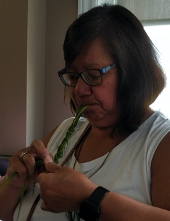Spotlight Interview with Treasurer Valerie Ghosen

Val has been working with NCNW since 1992 in various roles and has been active in the Indigenous community for 41 years. Currently, she serves as the Treasurer on the Board of Directors. From Six Nations, Val is a mother to three wonderful adults and a grandmother to three fur babies. She was raised with the empowering belief that we should live to prepare our next seven generations and try to help guide them to better choices and strong decision making skills. Read on to get to know Val as we do here at NCNW.
Q: What is your background and your family’s background?
A: Sago, I’m Valerie Maracle-Ghosen and my family is from Six Nation. I am Cayuga- Mohawk, Turtle clan. My mom was Doris Miller-Hill and my dad was Harry (Dewy) Maracle; I had one brother, Daniel W Maracle, all who have passed. I have three wonderful adult children which include John Szabo (& Gladys Henry who have 5 boys), George T Ghosen Jr, and Jessica Ghosen (& Josh Moran with 3 fur grand pups).
Q: What are some ways in which you like to celebrate your Indigenous heritage?
A: I married my husband George who is Seneca and we have been together for the last 35 years. He also achieved his B.A. from Canicus College with a Masters in Native Studies from UB.
Additionally, we have both been working for the Native community through the Native American Community Service for beyond 14-20 years. This was followed by 6 years at the Native American Magnet School with the Native American Resource Program while George has spent more than 10+ years there. We both completed our careers working for the Buffalo Board of Education and retired in 2017.
Q: Who was/is an Indigenous woman that may have been significant in your life and why?
A: There have been several women who have mentored me and guided me while staying close to our culture: my great-grandmother and grandmothers from both sides, 8 wonderful aunts, mostly several female elders at NACS and PS#19, and Ms. Germaine Myke and Fran Hill to mention a few.
Q: When and how did you start volunteering or working with the Indigenous community? Why was and is it important to you?
A: My work in the Indigenous community, as mentioned above, covers a total of 41 years in various different positions. Even while working for just the school board I always pointed out that our Native community needed to be covered.
We were all raised that we need to prepare our next 7 generations and try to help guide them to better choices and strong decision making.
Q: When and how did you first get involved with the Chapter?
A: I’ve been active with NCNW since 1992 with hopes of enticing our younger women to get involved and keep our traditions and services going forward.
Q: Why is it important for Indigenous women to have organizations like NCNW where we are governed by Indigenous women?
A: We may not all hold degrees but we offer help from learned and caring positions for our community. We believe in community, togetherness and love for our people.
Q: What is your most memorable accomplishment in working with NCNW?
A: Oh wow, the most memorable accomplishment would be assisting and taking our staff from a near zero funding situation and believing our staff could take us back to a secure funding level – which was able to happen!
Q: What is your next goal?
A: The next goal would be to bring our agency (NCNW) to a higher level of expertise through pushing and training our staff and community to reach a competitive level among not for profit agencies who service our community and guide them to always include our community in funding levels.
Q: What is the most important message you would like to get across with your work and involvement with the Indigenous community?
A: I would love to engage our young women to become active members and participate with NCNW so they can take our spots and keep our agency strong and active in our community going forward.
Q: What is an important lesson others can learn about the Indigenous culture and people?
A: That our community team efforts have always been our way of life and caring for one another is beneficial in so many ways.
Q: In your opinion, how can someone become the best ally possible to the Indigenous community?
A: By participating and helping our community to be healthy, and preserving our culture with others through sharing and practicing our inherited way. Whether in culture, language, dance, or song – there are so many different ways we help one another.
Q: It was mentioned that you live in Buffalo but work in Fort Erie, has the border issue affected you and if so, how? What are your thoughts on this?
A: I’ve always lived in Buffalo and my family has never let the border stop how we could help our Native families. I don’t believe the border should be a hindering in when, what or how we treat one another.
Q: What does the Indigenous community or Indigenous women need the most from Canada at this point in time?
A: To be treated fairly and keep our family together.
